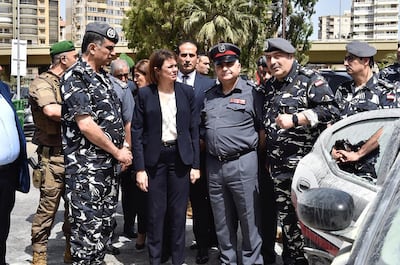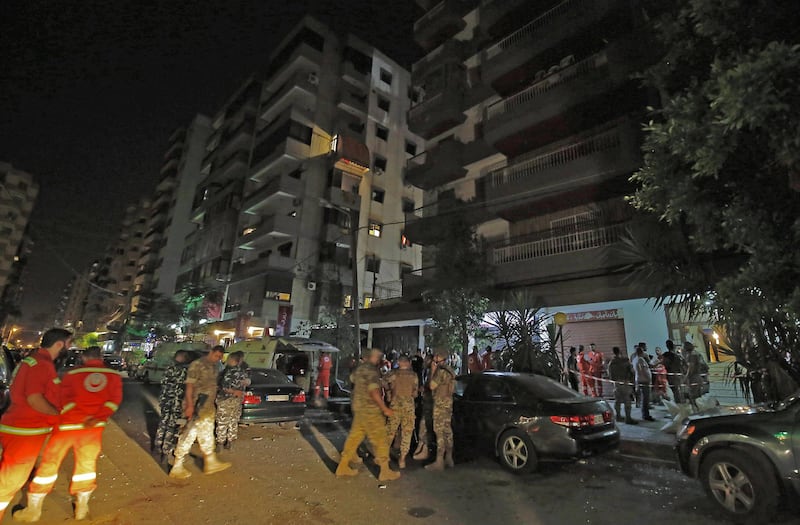A former ISIS fighter killed two Lebanese soldiers and two police late on Monday evening during a shootout in the northern city of Tripoli, before detonating an explosive belt when cornered.
President Michel Aoun called for exceptional security measures over the summer holidays, saying the attacker was motivated by revenge against the Lebanese army and internal security forces.
Interior Minister Raya El Hassan condemned the attack and said security forces were taking precautions to prevent more violence.
“Tripoli today was supposed to be celebrating Eid Al Fitr but unfortunately people experienced a terrifying night,” she said on Tuesday. “The army paid a heavy price for protecting the city.
“Tripoli succeeded against terrorism yesterday thanks to the co-ordination between the army and the security forces.”
The gunman was identified by officials as Abdel Rahman Mabsout, who served a year in prison between 2016 and 2017 for fighting with ISIS in Syria. Mabsout fled Lebanon after his release for Syria again.
About 11pm on Monday night, he opened fire at the Central Bank in the northern city and shot at a police post near the Tripoli municipal building.
He then drove around the city on a motorcycle, firing at soldiers and police and leaving many wounded.
One of the soldiers was killed when Mabsout opened fire on an army vehicle, the state-run National News Agency reported.
A second soldier died later from his wounds, the military announced just before 2am.
The army set up a security cordon and a special unit of its intelligence directorate began searching for Mabsout, tracking him down to some residential buildings.
He detonated the vest during a final stand-off with the military, although the army said no one else was wounded in the blast.
Before the attack, the military said it had posted extra troops across the country, especially around places of worship, to ensure security during Eid Al Fitr.
On Tuesday, the army identified the dead soldiers as First Lt Hassan Farhat, 29, and soldier Ibrahim Saleh, 21.
Sgt Johnny Khalil, 27, and Cpl Youssef Faraj, 37, a father of one, were shot in the head from behind while patrolling in the port area, the Internal Security Force said.
They had been out on patrol after reports of a bomb attack.
Ms El Hassan said Mabsout was a “lone wolf” and his release from prison after only a year was under investigation.
On Tuesday afternoon, the Lebanese army raided his home in Tripoli and arrested his father and brother.
Lebanon’s leaders also denounced the attack.
"Eid Mubarak to all Lebanese who would have been happy if it were not for the loss of four of our best sons from the armed forces", tweeted Finance Minister Ali Khalil.
“They died at the hands of someone who does not understand religion and did not deserve to live."
Hezbollah condemned the attack, saying that it proved that ISIS did “not respect the sanctity of religion, values or morality. Only killings and bloodshed”.
The security situation has been largely stable in Tripoli for the past four years.
In the early days of the Syrian war, the mainly Sunni residents of Bab Al Tibbaneh neighbourhood clashed with the mostly Alawite area of Jabal Mohsen in Tripoli.
The two sides fired at each other from across the dividing Syria Street that separated the communities.
But the army rolled out a security plan in mid-2014 that aimed to put an end to the fighting and round up the instigators. Since then, there have been no widespread clashes in the city.
The underdeveloped metropolis is the country’s second largest city after Beirut, but suffers from under-investment, high unemployment and few prospects.
In some of the poorest neighbourhoods, recruiters have found willing volunteers to join hardline groups in Syria.
Monday’s incident is Lebanon's first major attack connected to the Syrian conflict since the Fajr Al Jaroud military operation in 2017 on the border to clear militants linked to Al Qaeda and ISIS.
There was a separate operation weeks before that by Hezbollah near Arsal.

The 2017 operation cleared the last Lebanese territory held by militants who seized it in 2014 when they overran the border town of Arsal, but were pushed into the surrounding hills by the military.
Lebanon has faced a significant spillover from the neighbouring conflict. It has hosted more than a million refugees from Syria, and suffered bouts of instability and terror attacks from 2013 to early 2015.
Efforts were made to secure Lebanon with an internationally funded military assistance package.
Border regiments were trained and equipped to help stop explosive-rigged cars and militants freely crossing the rugged border between Lebanon and Syria.
Hezbollah launched a military campaign to recapture the Qalamoun Mountains on the Syrian side of the border from hardline groups.
Rebels also created a security buffer, although the pockets around Arsal were still held until Lebanese military and Hezbollah offensives in 2017.
The combined impact was a drop in attacks from Syria, although isolated incidents still took place.






